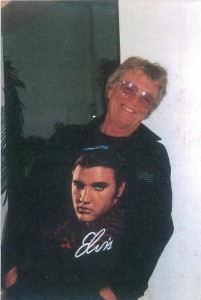Media: June 2013
In April of 1967, a 27-year-old disc jockey walked into the radio studios of WCFL-AM in Chicago to start his brand new job as the overnight man. The city didn’t exactly greet him with open arms.
“I replaced an all-night jazz show,” he remembers, “and the listeners who were addicted to that show were not happy with my oldies playlist and let me know about it. The very first caller said to me, ‘What’s this Brenda Lee shit, baby?’ I just stopped answering the damn phone after that.”
That’s how one of the most legendary radio careers in Chicago history began. The unappreciated overnight jock went by the name of Larry Lujack, and despite the rocky start, his arrival would change Chicago radio forever. WGN’s current morning man Jonathon Brandmeier sums up Lujack’s gigantic contribution this way: “Larry taught us that we could be ourselves on the radio.”
In 1967, that was a truly radical concept.
“It was common to see a sign in radio control rooms that said: ‘SMILE!'” Lujack explains. “You were supposed to have a big smile on your face when you talked on the air and be the listener’s best friend. I thought it was fake and phony, and I just wanted to be me – a sarcastic and cynical guy. I was fired all over the country for not being friendly enough, but I always thought it would work. So I kept on doing it.”
Sarcastic and cynical Chicago responded. The powers that be at ‘CFL’s crosstown rival, WLS-AM (890), hired Lujack to take over their high-profile afternoon slot and then moved the ironically self-proclaimed “charming and delightful” Old Uncle Lar into the one time slot you’d never expect a cranky and moody guy to succeed: morning drive. He not only flourished, but discovered a bit that would define his Hall of Fame career.
“WLS aired a farm report during mornings to satisfy FCC requirements for public service,” Lujack remembers. “The farm show had previously consisted of reading hog and grain prices, and it was really boring. So I started going through newspapers and magazines finding weird stories about farmers and their animals and reading those instead. I was amazed by what happened next. I started getting letters from all over the Midwest. In little towns the newspapers are filled with these stories. I read them on the air and before I knew it, people were calling to say, ‘I wish the farm show was longer!’ That blew my mind.”
It wasn’t long before these vignettes were no longer a solo act. The jock on the air after Lujack’s show, Tommy Edwards, slowly became part of the bit.
“Tommy used to be in the studio getting ready for his show because he was on after me. At first he didn’t take part, he was just getting his music and paperwork together. He made fun of me, and giggled, and laughed, and scratched his ass, and sometimes I asked him a question or he asked me a question about whatever the story was that day. I started referring to him as Little Tommy and it gradually evolved into a two-man bit.”
“Animal Stories” was a sensation, and it didn’t just propel Larry & Tommy into the stratosphere, it affected the entire station.
“AM radio was no longer the hip thing by the late ’70s, early ’80s,” Lujack says. “These FM drug addicts would throw cabbages at our station vans when we were in parades. They thought we sucked! So I suggested we change the vans into ‘Animal Stories Mobile Units,’ and all of a sudden it completely transformed people’s opinions. They cheered the vans instead. From that point on, even the station’s commercials featured ‘Animal Stories.’ That one thing changed the image of the whole station.”
It also led to a movie trailer. Lujack still hears from people who remember the famous film of him hypnotizing a chicken. Ironically, it could have been a disaster.
“We had a staff meeting at WLS one day to come up with a unique concept for a movie trailer to promote the station. Nobody was coming up with anything, so I raised my hand and said, ‘I know how to hypnotize a chicken.’ They loved the idea. The only problem was that I had never actually done it. I had only seen a guy do it once on a kids’ science show many years earlier. I was sweating bullets. I thought, ‘If this doesn’t work, they’ll have wasted thousands and thousands of dollars on the dumbest thing ever.’ But it worked like a charm, and I breathed a humongous breath of relief.”
Lujack retired from WLS in 1987 and moved to Santa Fe, N.M., in 1997. Other than a short return trip to the airwaves via remote link on former WUBT-FM (103.5) in 2000 and with old pal Edwards on WRLL-AM (1690) last decade, he hasn’t been back since. He insists that’s the way it’s going to stay.
“Once in a while I’ll hear an animal story or see something about a Hollywood slut and some good lines will come to me, and I’ll think, ‘Damn, I wish I was on the air so someone could hear these,’ but that’s as far as it ever gets. As for going back on the air every day, that’s not going to happen and certainly not the way radio is today. Once upon a time, it was a fun job. It was stressful as hell knowing you were one rating point or one screw up away from being out of work. And it was hard work, but God it was fun.”
Not as much fun as it was listening to it.
— Rick Kaempfer












